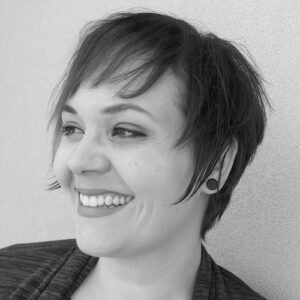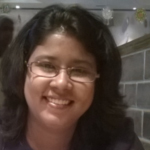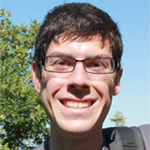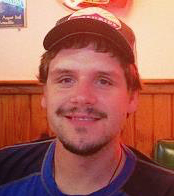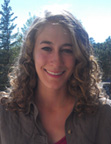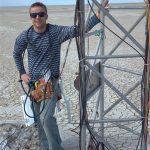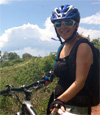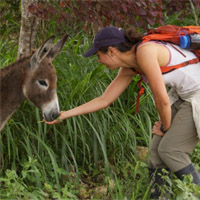"The GCSC effectively brought me to the University of Utah. My advisor's affiliation, the financial support, as well as the promise of interdisciplinary training were simply too good to pass up. I have been elated by the opportunity to dive into collaborative, interdisciplinary work, and even more appreciative of the passionate community within the GCSC."
- Chris Zajchowski, GCSC Fellow
The GCSC First Year Fellowship has helped attract top students who have research interests around the broad themes of the environment and sustainability, and who seek graduate training that extends beyond the scope of a single discipline. While these students receive their degrees from different departments across campus, the GCSC provides interdisciplinary training experiences that will help prepare students for broad engagement and collaboration in the professional realm.
GCSC Fellow Cohorts
Meet this year's group of outstanding graduate fellows and read about their accomplishments and interests. With additional support from the Wilkes Center for Climate Science and Policy, the 2023-24 GCSC fellows comprise our largest cohort ever.
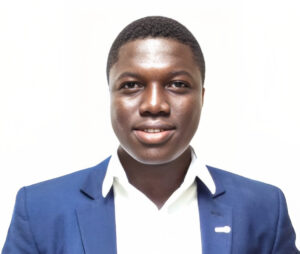 Ebenezer Adomako-Mensah
Ebenezer Adomako-Mensah
Department of Geology & Geophysics
I earned my Bachelor of Science degree in Geological Engineering from the University of Mines and Technology (UMaT), Tarkwa, Ghana. My experience with water quality issues during my tenure as a Projects Director for Rotary Club of Obuasi, Ghana ignited my interest in researching the crucial aspects of water contamination. As a master's student pursuing Geological Engineering at the University of Utah, I will be working with Professor William P. Johnson on researching colloidal contaminant transport in aquatic and groundwater systems. By investigating the fate and transport of colloidal contaminants, I aim to contribute to SDG 6, ensuring the availability, protection, and sustainability of water resources. I am inspired by the potential of aquatic and groundwater systems to drive positive change and envision a future where the responsible management of water resources is a cornerstone of sustainable development.
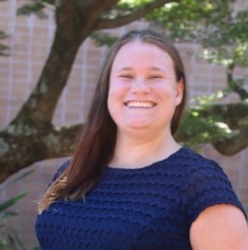 Colleen Armstrong *
Colleen Armstrong *
Department of Communication
Having achieved my first bachelor’s degree in environmental studies from Trent University in Canada, my love of the environment is strongly rooted where Indigenous rights and the rights of Mother Earth intersect. I was able to pursue decolonial studies through my humanities degree from Brock University after this, and then my master’s degree at U.N.C. Charlotte after that. As a result, my academic focus has always been on the conflict that occurs when the environment is jeopardized on Indigenous land. Recently I have been engaged with the Fairy Creek blockade, having spent time volunteering there in 2021. Considering the epistemological differences between the colonial powers and the people native to the territory, I strive to tell the stories of the people who live these conflicts with the help of Dr. Chris Ingraham and Dr. Danielle Endres. I work to decolonize academia, and to show how people can tell the story of the land in different ways – particularly during times of civil unrest and climate emergency.
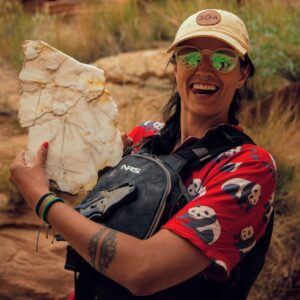 Sam Bagge *
Sam Bagge *
Department of Geology & Geophysics
Sam Bagge (she/her) graduated from The U in 2022 with Geology, Environmental Studies, and Geography degrees. She’s spent the past year and a half guiding and running rivers in the desert southwest. She is returning this fall to get her Master’s in geology studying her favorite whitewater section, Cataract Canyon (Colorado River), with Dr. Cari Johnson. Working alongside the Moab-based nonprofit Returning Rapids and the USGS, she will examine sediment cores from the Colorado River delta in Glen Canyon and work with local river runners and guides to collect widespread suspended sediment rates in the same canyon system. Her goal is to work with local government agencies and citizen groups to create an equitable and effective sediment management plan for the next phase of Lake Powell/Glen Canyon Dam.
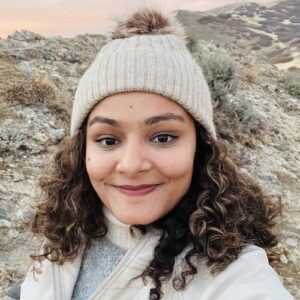 Suraksha Bhandari *
Suraksha Bhandari *
City & Metropolitan Planning
I received a bachelor's degree in Architecture and a M.S. in Disaster Risk Management from Tribhuvan University, Nepal. Throughout my education and professional experience, I have consistently been drawn to the fields of planning and disaster risk management, and I firmly believe that effective planning serves as the bedrock for mitigating risks associated with natural disasters. As I delved deeper into my studies and career, I developed a profound interest in interdisciplinary research that addresses the challenges arising from human-environment interactions. I am particularly driven to explore sustainable approaches to combat pressing issues like climate change, wildfire and its associated disasters. As a graduate student at the University of Utah, I will be working with Dr. Divya Chandrasekhar in finding innovative ways to integrate our disaster risk management system with reliable strategies to confront new challenges such as climate change, wildfires, and droughts.
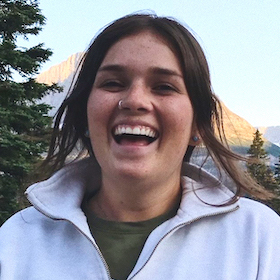 Annie Carlile *
Annie Carlile *
School of Biological Sciences
After growing up here, in the beautiful valleys of Utah, and receiving my B.S. in Environmental Science from Trinity College, my love for the natural world has only continued to grow. I have spent the past few years working in the healthcare and diagnostics industry, and I am incredibly excited to be back in academia and to be a part of a cohort that aims at bridging the gap between science and policy. While earning my Ph.D. with Dr. Dave Bowling, I hope to deepen my understanding of ecology in a changing world using remote sensing and machine learning, and I am passionate about finding nature-based climate solutions.
 Rojina Haiju *
Rojina Haiju *
Department of Geography
I completed a Bachelor's degree in Environmental Engineering at Kathmandu University in Dhulikhel, Nepal, and earned a Master's degree in Integrated Water Resources Management from the University of Applied Science in Cologne, Germany. Under the guidance of Dr. Summer Rupper, I look forward to exploring innovative approaches to gaining a deep understanding of climate change, weather patterns, and water resources.I was drawn to Utah in part because the mountain and wetland ecosystems are similar to those in my home country of Nepal.
I received both my Bachelor of Music with a focus in organ performance and my masters degree in Musicology with research focused on underrepresented communities within musical veins from Brigham Young University. My research interests lie in encouraging growth, outreach, and retention of individuals from underrepresented communities within the composition and theory professional fields. Working with the composition and theory departments I will be researching past efforts made towards these goals and, with Dr. Elisabet Curbelo, I hope to identify new possibilities for encouraging equity, diversity, and inclusion.
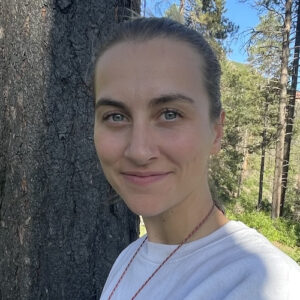 Tegan Lengyel *
Tegan Lengyel *
School of Biological Sciences
Being surrounded by the Wasatch mountain range from a young age led to my interest in environmental studies. After spending time working in various labs and falling in love with research, I chose to pursue graduate studies after completing a bachelor's in biology at the University of Utah. Dr. William Anderegg’s lab has proven to be the perfect place for me to explore my interests; I plan to investigate the effects of climate change on forest health and biodiversity and look forward to working with the GCSC cohort.
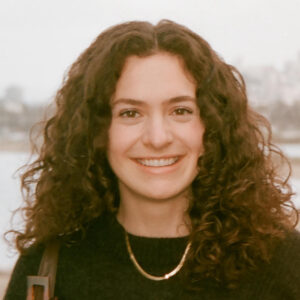 Alyssa McGrath *
Alyssa McGrath *
Department of Anthropology
I received my MS degree at The George Washington University’s Center for the Advanced Study of Human Paleobiology (CASHP), where my interest in the intersection of human evolution and ecology began. During my master's degree, I worked on paleoecological research in Eastern Africa. As I begin my doctoral research with Dr. Tyler Faith at the University of Utah, I plan to investigate the impacts of climate change and human impacts on past large mammal extinction events in South Africa. I hope that an improved understanding of past extinction events will contribute towards conservation efforts and policy decisions aiming to sustain biodiversity into the future.
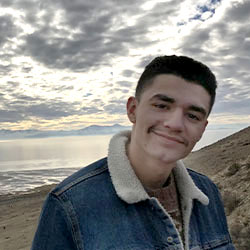 Ishmael Medina *
Ishmael Medina *
Department of Anthropology
I completed my undergraduate studies at the University of Utah, where I earned a Bachelor of Science degree in Anthropology with an emphasis in Archaeological Science. Following my bachelor's degree, I continued my academic journey in the Department of Anthropology and obtained a Master of Science. During my postgraduate studies, I dedicated my research efforts to reconstructing Utah's Indigenous maize farming niche and exploring the intricate relationships between farmers and their local ecology. With the guidance and support of my advisor, Dr. Brian Codding, I plan to expand this project to encompass the entirety of the continental U.S. By doing so, I hope to gain insights into how past farmers adapted to climate change, which can provide valuable lessons for addressing future climate challenges.
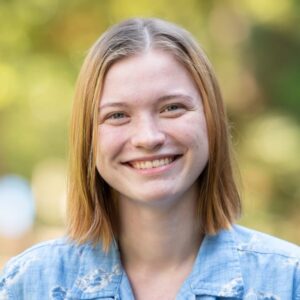 Hannah Meier *
Hannah Meier *
School of Biological Sciences
I earned a B.A. in biology with a focus on philosophy from Reed College in 2021. Post-graduation, I worked as a research assistant studying the effects of thermal acclimation on phytoplankton populations. My upcoming research under Dr. Jody Reimer explores the influence of anthropogenic climate change on the Great Salt Lake, focusing on how populations respond to rising salinity levels.
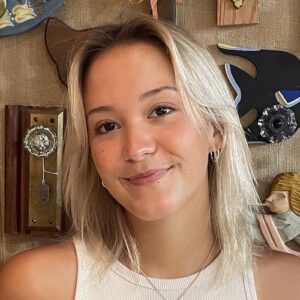 Kaylee Molan *
Kaylee Molan *
Department of Civil & Environmental Engineering
Growing up I constantly heard climate change being discussed on the news and knew from a very young age I was passionate about making positive environmental changes and also had a strong interest in science, mathematics, and design. Following this passion, I graduated this past May from the University of New Hampshire with a B.S. in Environmental Engineering and will now be pursuing an M.S. in Environmental Engineering. I will be working with Dr. Emily Marron, broadly focusing on wastewater reuse. I am excited to work on a project that will help protect the environment and public health, as well as contribute to better management of our water resources!
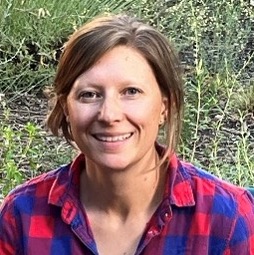 Christine Rumsey *
Christine Rumsey *
Department of Geology & Geophysics
I received a B.S. in civil engineering from the University of Wyoming and a M.S. in environmental engineering from Utah State University. Since then, I’ve worked for the U.S. Geological Survey for the past nine years as a hydrologist studying a diverse set of topics, including groundwater discharge to streams, salinity trends in surface and groundwaters, and nutrient and salt cycling in Great Salt Lake. As a PhD student at the University of Utah, I will be working with Dr. Brenda Bowen to study how water quality and water availability relate to habitat type and productivity in saline lake ecosystems.
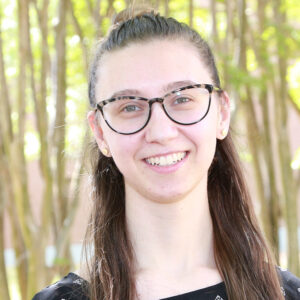 Rebecca Senft *
Rebecca Senft *
School of Biological Sciences
I received my BS in Plant Biology from Kennesaw State University, where my interest in ecological research began. During my undergraduate degree, I worked on several projects that explored anthropogenic change's impact on plant physiology and communities. In my graduate studies, I plan to work with Dr. Luiza Aparecido to investigate how global change stressors, such as heat and drought, affect the local hydrological cycle and carbon balance of plants across the Great Salt Lake Valley. Understanding how local forests function under changing climate is essential for the development of sustainable mitigation actions that will lead to environmental cooling and higher water availability. This work will include interdisciplinary collaborations to ensure accessible and manageable recommendations result from the findings of my work.
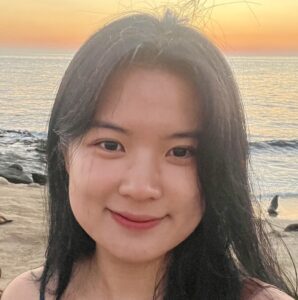 Jiwoo Seo *
Jiwoo Seo *
Department of Geography
After graduating from the department of geography at Kyung Hee University in South Korea, I'm interested to develop optimal solutions by modeling and simulating social problems that are closely connected to our communities. My biggest goal during my master's program is to be able to make predictions of the future based on computing technology. I will focus on replicating reality by 3D modeling with drones and simulating the movement of objects, including humans, in a reality-based virtual space. Computing-based simulations, such as performing best-path search simulations in buildings in disaster situations such as fires or modeling the spread of virus particles in confined spaces, will be an extension of my past work based on GIS computing. With the advice and teachings of Dr. Alexander Hohl, I will help solve the problems our society faces with these methodologies.
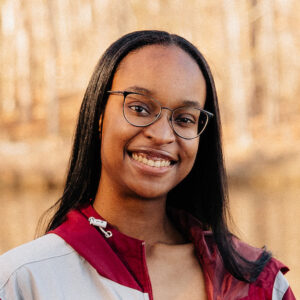 Cambria White *
Cambria White *
Department of Atmospheric Sciences
I received my Bachelor’s degree in Geography from North Carolina Central University where I developed a deep appreciation for the intricate interplay between Earth's physical systems. Through being exposed to the many branches of Geography in my undergraduate years, I found my inspiration to study Atmospheric Science. As a graduate student in the Department of Atmospheric Sciences under the guidance of Dr. Derek Mallia, I look forward to studying land-atmosphere interactions and how anthropogenic actions can influence air quality, climate, and weather. I also look forward to using my interests in photography and communication to share research findings through multiple forms of visual media.
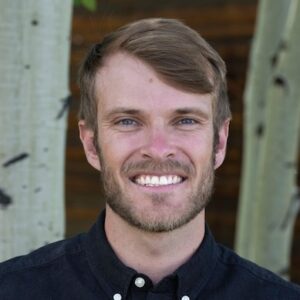 Ben Williamson *
Ben Williamson *
Department of Geography
I’m a doctoral student in Geography, with interests in human geography, environmental politics, technology, and interdisciplinarity. Before returning to graduate school, I was the Executive Director of a Wyoming-based non-profit focused on supporting innovative social and ecological research. Prior, I received a Bachelor’s degree in Ecology from the University of Montana and a Master of Environmental Management degree from the Yale School of the Environment. As a PhD student with Dr. Matt Fry, I’ll be studying the extent to which digital technologies lead to better equity and ecological outcomes in urban forestry contexts. My research will focus on the intersection of environmental change, knowledge production, and emerging technologies.
*GCSC/Wilkes fellows aim to pursue research specifically related to climate science and/or policy.
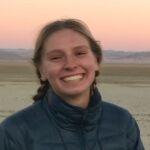 Amelia Muscott
Amelia Muscott
Department of Geology & Geophysics
Growing up among the mountains, oceans, and forests of the Pacific Northwest fostered my love for our natural world and inspired me to earn a B.A. in Geology. During my time at Occidental College, I participated in paleoclimatology and sedimentology research and became excited about studying past climate change to answer important questions surrounding current and future environmental change. While working with Dr. Sarah Crump at the University of Utah, I will pursue a paleoecology project that applies ancient sedimentary DNA to reconstruct past ecosystem change in Summit Lake, Nevada. Our goal is to work closely with the Summit Lake Paiute tribe to observe how the lake system responded to Holocene megadrought events, which will ultimately inform environmental management and conservation efforts in the Great Basin.
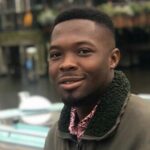 Rexford Osei Owusu
Rexford Osei Owusu
Department of City & Metropolitan Planning
I received my Bachelor of Science degree in Human Settlement Planning from the Kwame Nkrumah University of Science and Technology (KNUST), Kumasi, Ghana. I went on to receive my Master of Science degree in Geo-information Science and Earth Observation specializing in Urban Planning and Management from the University of Twente, Enschede, the Netherlands. During my master’s studies, I developed a strong interest in researching human-nature interactions. Hence, as part of my Ph.D. program in Metropolitan Planning, Policy, and Design at the University of Utah, I would like to further explore my interest in fostering human-nature interactions for sustainable development with my advisor Dr. Alessandro Rigolon.
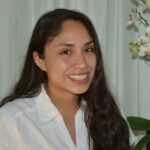 Sandra Ramirez Garcia
Sandra Ramirez Garcia
Department of Geology & Geophysics
I received my B.S in Earth Sciences from the National Autonomous University of Mexico. My experience with magnetism and rocks led me to work with Dr. Peter Lippert. My goal as part of the Ph.D. program of Geology is to asses air quality problems in urban environments and to enhance regulations for improving it. I will particularly focus on air quality problems at Salt Lake City basin and I would like to address similar problems in my hometown, Mexico City. This work will integrate both earth science and medical expertise.
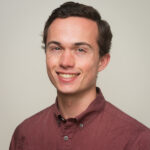 Daniel Ritter
Daniel Ritter
Department of City & Metropolitan Planning
Since receiving a bachelor’s degree in public policy from American University, I worked for the Partnership for Public Service in Washington, DC. In my role, I was responsible for monitoring and evaluating our leadership development programming, as well as managing a leadership program for senior executives at a cabinet-level agency. As a master’s student in the Department of City and Metropolitan Planning, I plan to focus on transportation and public land usage. I will be working with Professor Keith Bartholomew to study sustainable transportation options in both gateway and natural amenity regions and urban areas. Transportation is intertwined with public health, climate change, and systemic inequality and is a critical aspect of planning for sustainable cities and regions.
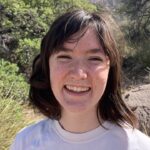 Maggie Scholle
Maggie Scholle
Environmental Humanities Graduate Program
I graduated from the University of San Diego as a student of Environmental Science, and am now pursuing study in the Environmental Humanities. I am eager to collaborate with students in the sciences, and am particularly interested in studying the intersection between the social and scientific study of water and climate systems. My academic interests lie largely in telling stories of landscape deformation and changes in relationships to land, in addition to studying communication theory to develop a framework for deriving action from engagement with negative environmental news.
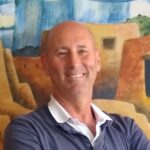 Ean Warren
Ean Warren
Department of Civil & Environmental Engineering
 Anahi Yerman
Anahi Yerman
Department of Anthropology
Through my life I have lived in many places including Mexico, New Zealand and several states in the US which gave me a deep appreciation for the intersection of anthropology and the environment. I combined my passions and received an Anthropology BA and Philosophy of Science BS at the University of Utah. I will continue studying Anthropology under the mentorship of Dr. Shane Macfarlan focusing on field-based ethnographic research on the Baja California peninsula with traditional ranchers located in the Sierra de la Giganta Mountain Range.
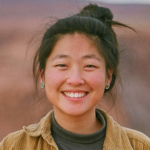 Jaimie Choi, environmental humanities
Jaimie Choi, environmental humanities
I received my bachelor’s degree in Environmental Systems from the University of California, San Diego. Since then, I’ve worked as a field ecologist in Yellowstone National Park, Catalina Island, and the Central Valley to study invasive insects and plants. I will be working with Dr. Carlos Gray Santana to research invasive species rhetoric and management strategies used in the United States
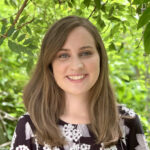 jessica chaplain, communication
jessica chaplain, communication
Growing up in the Appalachian Mountains, I have always had an appreciation for the environment around me. Receiving my BA in English and BS in Communication Studies from Appalachian State, with its heavy focus on sustainability, only solidified for me the importance of transforming society's relationship to the natural world. At the University of Georgia, I became passionate about addressing climate change through examining the way rhetoric shapes the possibilities and limitations for climate action. In my studies at the University of Utah, under the guidance of Dr. Danielle Endres, I will continue to examine the way time, space, and affect shape how we understand and make sense of climate change, specifically within international discourse.
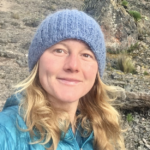 tara hetz, parks, recreation & tourism
tara hetz, parks, recreation & tourism
As a young girl growing up in East Africa, the allure of charismatic megafauna was inescapable. It was my dream to save the elephants and rhinos of the world. I was introduced to ecosystem conservation at a young age and continued my studies in Conservation Biology at St. Lawrence University in Northern New York. My desire to save the world’s wildlife gave way to identifying why biodiversity is important and how to integrate people in conservation actions. I am interested in investigating community based conservation initiatives and how tourism plays a role, especially adventure-conservation tourism. I will be joining the Parks, Recreation and Tourism department at the University of Utah. My goal is to conduct research in social-environmental science. I want to contribute to the development of interdisciplinary conservation science with a comprehensive understanding of social-ecological interactions. I want to help better engage communities in protected area conservation design, custodianship of natural resources and improvement of livelihoods.
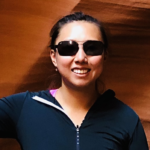 MAKAyLA LOEY, CIVIL & ENVIRONMENTAL ENGINEERING
MAKAyLA LOEY, CIVIL & ENVIRONMENTAL ENGINEERING
I grew up in the southern part of China. My hometown is a beautiful city surrounded by water. I received my B.S at Westminster College and a master's degree in environmental hydrology from the University of Utah. My master's research was involved with natural pollutants in stormwater in the City of South Salt Lake. As a Ph.D. student at the University of Utah, I will be working with Dr. Jennifer Weidhaas to explore the dynamics of how animal cells deconstruct by common viruses in municipal wastewater with the presence of common wastewater pollutants. My research will be focused on the intersections between environmental pollutants and human health.
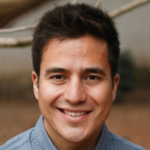 mario JOAQUÍN lópez, city & metropolitan planning
mario JOAQUÍN lópez, city & metropolitan planning
I became fascinated by the complexity of ancient Mayan cities during my undergraduate architectural studies at the University of San Carlos in Guatemala. In 2015, I went on to study a master’s degree in Regional and Environmental Development at the University of Valparaíso in Chile. It was during this time, that I conducted research about environmental planning policies and indigenous Mapuche territory. Since my return to Guatemala in 2017, I have taught urbanism and ecology classes at my alma mater, seeking to share the knowledge that I gained abroad. My goal as a part of the Ph.D. program in Metropolitan Planning, Policy, and Design is to integrate ancestral indigenous knowledge in urban and regional planning processes in today’s cities under the supervision of Dr. Stacy Anne Harwood.
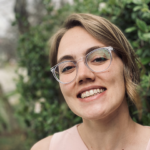 BAYLEE OLDS, GEOLOGY & GEOPHYSICS
BAYLEE OLDS, GEOLOGY & GEOPHYSICS
I graduated from the University of Utah with a B.S. in Environmental Geoscience and a B.S. in Geography with a Climate Change emphasis. I will be continuing my academic career through a master’s degree, under the guidance of Dr. Paul Brooks. Building on my undergraduate experience with snow, chemistry, and atmospheric particulate matter transport, I will study how snowmelt is partitioned to surface and ground-water resources. This research is important in identifying and addressing the vulnerability of the water supply in our changing climate.
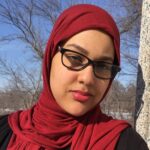 LAILA SHEIKH, GEOGRAPHY
LAILA SHEIKH, GEOGRAPHY
Laila graduated from the University of St. Thomas in Saint Paul, MN with a doubl emajor in Geographic Information Systems and Environmental Studies, with a minor in Justice and Peace Studies. Laila writes, "In my home country, Kenya, I see the unfortunate consequences of climate change on vulnerable communities including my own. Consequences such as lack of access to water and extreme weather events destroy agriculture and built infrastructure among other consequences." Laila will be working with Dr. Andrew Linke to study the relationships between global warming, weather variability, and migration.
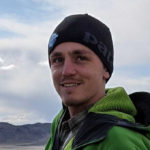 DOUG TOLMAN, ART & ART HISTORY
DOUG TOLMAN, ART & ART HISTORY
Having grown up in a culture where economy takes priority over ecology, it wasn’t until I learned a more complete story of the land that I really started to care for it. I’m now an ecological artist, using interdisciplinary practices to foster an understanding of land use and sense of place within my community. While achieving my MFA, I plan to further integrate my passions for art, education, adventure, and activism into a path which facilitates stewardship of planet and people. With the GCSC, I hope to collaborate with social and physical scientists in art installations which prompt our community to participate in solutions to ecological imbalance and social inequity. My advisor is Wendy Wischer.
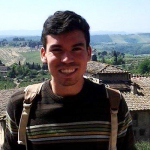 Kevin fagundo-ojeda, city & metropolitan planning
Kevin fagundo-ojeda, city & metropolitan planning
I completed a bachelor’s degree in Sociology from the University of Puerto Rico and a master’s degree in Community Development and Planning from Clark University. While in Puerto Rico I worked in research related to urban transformations, food systems, migration, industrialization and disasters in San Juan. During the summer of 2019 I worked with The Center for Puerto Rican Studies at Hunter College on a research focused on Puerto Rican migrants in New England following Hurricane Maria. I will pursue a PhD in Metropolitan Planning, Policy and Design at the Department of City and Metropolitan Planning. I will be working with Dr. Ivis García-Zambrana on topics of disaster resiliency, health, policy and housing in Puerto Rico.
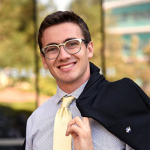 noah hirshorn, atmospheric sciences
noah hirshorn, atmospheric sciences
I grew up in Colorado and spent a lot of time in the mountains which influenced my decision to study environmental science with a chemistry concentration at Colorado College, where I was part of the Task Force on Climate Change. In summer 2019, I interned for the NASA Student Airborne Research Program which piqued my interest in the atmospheric sciences, specifically aerosol chemistry.
I am pursuing a M.S. in atmospheric science as part of Dr. Gannet Hallar’s group. My specific research is focused on determining whether or not atmospheric mercury influences new particle formation as well as measuring trace gases and meteorological conditions for a larger NSF campaign studying atmospheric mercury.
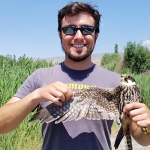 Kyle Kittelberger - biology
Kyle Kittelberger - biology
I am an avid birdwatcher, entomologist, and wildlife photographer, fascinated by the beauty and complexity of the natural world. For my undergraduate studies at Dartmouth College, I double majored in biology and environmental studies, with a focus on ecology and conservation, and researched the arthropod community functional diversity and trophic relationships of a northern forest for my honors biology thesis. Over the years I have worked as an avian field researcher in Wyoming, California, and Turkey, and have a long term ongoing research project on hemipteran hoppers in my home state of North Carolina.
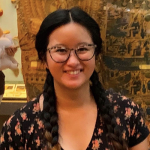 Roxanne Lamson, Anthropology
Roxanne Lamson, Anthropology
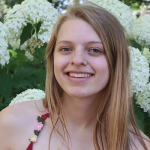 Delaney Mosier, mathematics
Delaney Mosier, mathematics
When I began my undergraduate studies at the University of Utah, I was broadly interested in studying mathematics. During my first year at the U, I started working with Dr. Ken Golden on mathematically modeling sea ice concentration fields in polar regions. After graduating with my BS in Mathematics from the U, I now have a focus on my research interests and a drive to make a global difference. I will continue conducting research with Dr. Golden as a PhD student in Applied Mathematics. I plan to use partial differential equation models of sea ice concentration fields to augment global climate models. I also hope to work toward a better understanding of the effect of dynamic and thermodynamic forcing from atmospheric and oceanic processes on sea ice concentration. I am thrilled to have found a unique field combining two of my passions: mathematics and environmental activism. I know this work will be increasingly essential in helping to predict the fate of the polar ice packs and the ecosystems they support, as the planet continues to warm.
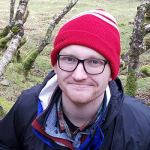 Douglas Pedersen, Mechanical Engineering
Douglas Pedersen, Mechanical Engineering
After four years in the United States Marine Corps, I obtained my Bachelors degrees in Mathematics and Mechanical Engineering at Michigan Technological University in the frigid upper peninsula. While at Michigan Tech, I discovered a love of sustainable energy systems and researched thermal chemical batteries for electric vehicles under the guidance of Dr. Sajjad Bigham.
At the University of Utah, I will be pursuing a Master`s degree in Mechanical Engineering under Dr. Roseanne Warren. My research will focus on life cycle assessment modeling of batteries.
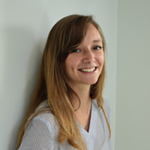 Delaney Sillman, City & Metropolitan Planning
Delaney Sillman, City & Metropolitan Planning
Being an Iowa native, I have seen the way that our interactions with the environment can completely reshape a landscape. My passion for changing the way that humans interact with the natural environment was encouraged at the University of Iowa where I earned a B.S. in Global Health and a B.A. in International Studies.
At the University of Utah I am pursuing a Masters in City and Metropolitan Planning, under Dr. Alessandro Rigolon. I look forward to pursuing my interests in public health, the built environment, and sustainability.
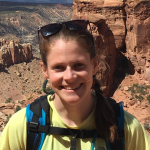 Erin Bessette-kirton, GEOLOGY AND GEOPHYSICS
Erin Bessette-kirton, GEOLOGY AND GEOPHYSICS
After studying physics, geology, and civil engineering as an undergraduate, I received an MS in geological engineering from Colorado School of Mines. Since then, I have worked for the U.S. Geological Survey Landslide Hazards Program, where I studied landslides throughout the western US, in Puerto Rico, and around the world. As a PhD student at the University of Utah I will be working with Dr. Jeffrey Moore to study the mechanical processes that condition and trigger natural hazards, with a focus on the effects of thermal processes in rock structures. I am also broadly interested in the impacts of global climate change on geohazard processes and hazard and risk communication.
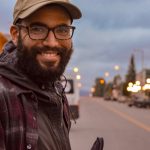 Nicolas Hernandez, communication
Nicolas Hernandez, communication
My research as a graduate student has focused on the internal rhetoric of scientists and engineers working on low carbon energy technologies (LCET). I find energy systems fascinating, as they can be both contributors to climate change and pollution, as well as loci for sustainable development and community empowerment. As such, my research interests include issues of environmental justice within the energy transition milieu. I will pursue a Ph.D. in Communication with Dr. Danielle Endres, seeking to better understand the confluence of efforts towards energy democracy and environmental justice in post Maria Puerto Rico
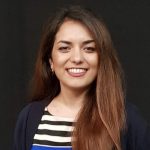 Sayma Khajehei, City and Metropolitan Planning
Sayma Khajehei, City and Metropolitan Planning
Assistant Professor, Geography & Environmental Planning, Towson University
I completed a Bachelor in Architectural Engineering at Shiraz University and a Master’s in Post-disaster Reconstruction at Shahid Beheshti University in Iran. I spent the next several years working as a lecturer in the University of Applied Science and Technology in Tehran and a researcher in Housing Foundation of Iran, where I covered everything from architectural design, post-disaster recovery, and documenting reconstruction projects. In 2017, I moved to Iowa to pursue a Master’s of Community and Regional Planning. My thesis explores the recovery challenges of public housing residents in Lumberton, North Carolina, in the aftermath of Hurricane Matthew.
I will be working with Dr. Divya Chandrasekhar in the Department of City & Metropolitan Planning as a Ph.D. student. My research interests include the ways in which the resiliency of socially vulnerable population in the community towards natural hazards are provided; how collective performance of social, economic, institutional and physical environments results in community resiliency; and how the resilience of a community is inextricably linked to both the environment condition and the resources’ treatment.
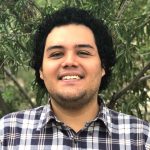 Roger Renteria, Sociology
Roger Renteria, Sociology
I earned my BA in sociology and entered the terminal MA program at University of Texas at El Paso. My sociological research ended up revolving around the study of social organisms and the systems that shape individual and group experiences. As my sociological knowledge has grown, I have expanded my perspectives on inequalities and ideologies and come to understand that they are rooted in social structures. At the University of Utah, I will pursue a Ph.D. in Sociology with Dr.Sara Grineski, researching environmental sociology and environmental justice.
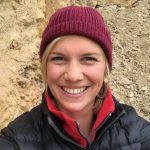 Hannah Satein, City and Metropolitan Planning
Hannah Satein, City and Metropolitan Planning
I am moving to Utah from Oregon where I completed my undergraduate degree in Planning, Public Policy and Management from the University of Oregon and my master's degree in Water Resources Policy and Management at Oregon State University. My master's work focused on the intersection of traditional and collaborative policymaking to facilitate more sustainable management of a river system in Central Oregon. I am excited to continue to explore the intersection of these methods of policymaking, as well as the roles of power and trust in environmental collaboratives in the American West. I will be working with Dr. Danya Rumore through the Metropolitan Planning, Policy, and Design PhD program and the Wallace Stegner Center's Environmental Dispute Resolution program.
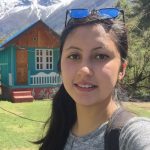 Kripa Thapa, Geography
Kripa Thapa, Geography
I was born and bred in the lap of the majestic Himalayas in Nepal, home to the highest peak, Mount Everest. My budding affinity towards nature led me to pursue my undergraduate degree in Environmental Science from Kathmandu University, Dhulikhel, Kavre, Nepal.
At the University of Utah, I will be undertaking a Master’s of Science in Geography, studying under the guidance of Dr. Summer Rupper. I aspire to become a changemaker and conduct pathbreaking research on glaciers, water resources, and climate change. Moreover, I want to render scientific justifications to environmental policies that can further be strengthened at a global scale and contribute towards a sustainable future for all. I plan to broaden my understanding of sustainability issues through the GCSC fellowship and am also looking forward to learning and working collectively with the faculty and the other GCSC fellows.
 Ning Xiong, Geography
Ning Xiong, Geography
I was born in China. I obtained my bachelor degree in construction management from China University of Geosciences. I got my master degree under the guidance of Professor Liyin Shen from Chongqing University, China, and have participated in several urban-related national research projects during this process. Following graduation, I worked as Research Assistant under the guidance of Dr. Ivy S.W. WONG at the Hong Kong Polytechnic University for a year to continue my research. At the University of Utah, I will be pursing a Ph.D. in Geography under the mentorship of Dr. Yehua Dennis Wei. My research will be focusing on sustainable urbanization and understanding the mechanics between fast urbanization and environmental sustainability.
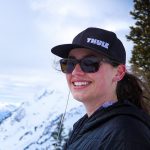 Dani Zebelean, Civil and Environmental Engineering
Dani Zebelean, Civil and Environmental Engineering
Environmental Engineer, Utah Department of Environmental Quality
Growing up the desert that is Salt Lake City, Utah, I developed a deep love for water. Specifically, how to conserve water and use it wisely. Going into college, I knew I wanted to study a subject that would enable me to help promote water consciousness around the West which is how I found Civil and Environmental Engineering. While completing my bachelor's degree in Civil and Environmental Engineering from the University of Utah, I further developed a passion for water treatment and water reuse. When I am not geeking out over the latest technologies or methods I'm outside playing no matter what the weather is like.
I will be pursuing a Master's degree working under Dr. Jennifer Weidhaas. My research currently is evaluating sustainable treatment options for industrial wastewater using bacteria from the Great Salt Lake to treat brine so it can be recycled through the treatment system. I will also be evaluating the potential for high saline groundwater remediation.
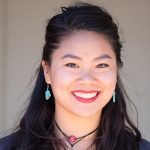 Katherine bui, environmental humanities
Katherine bui, environmental humanities
After receiving a B.S. in environmental science from the University of Texas at Austin, I am now pursuing an M.S. in environmental humanities at the University of Utah with Brett Clark and Jeffrey McCarthy as advisors. Some of my interests include sustainable food systems, paleoenvironmental change, and diversity, equity, and inclusion within the conservation field. I hope to combine my science background with the humanities to create a holistic narrative to educate and stimulate people to care for our natural world.
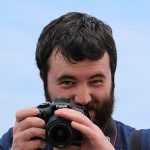 stephen cavanaugh, department of civil & environmental engineering
stephen cavanaugh, department of civil & environmental engineering
I graduated with my bachelor’s degree in Civil and Environmental Engineering from West Virginia University in 2017. During my time at WVU I kept myself busy by working on projects like the Department of Energy’s Solar Decathlon, working as a NASA undergraduate research fellow, and leading zip line tours at WVU’s Canopy Tour.
I will be working with Dr. Jennifer Weidhaas in the Civil and Environmental Engineering department. My primary research focus will be in the area of wastewater, water resources, and pathogenesis. I am currently working on microbial source tracking using ArcGIS and investigating the behavioral impact of specific nanomaterials on motile bacteria.
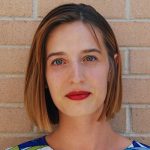 Rebecca Hardenbrook, Department of mathematics
Rebecca Hardenbrook, Department of mathematics
While completing my Bachelors of Science in Mathematics at the University of Utah, I became concerned with how climate change is, and will be, affecting our planet. I knew that I loved mathematics, but that I also wanted to contribute in some way to understanding the consequences of global warming and their effects on the environment. In my junior year, I began working with Dr. Ken Golden and his group on a project pertaining to convection-enhanced thermal transport in sea ice.
For my Ph.D. in applied mathematics, I will continue working with Dr. Ken Golden on various mathematical projects relating to sea ice. Currently, I am interested in studying two different projects: the study of the spectral theory of homogenization for transport in composite media from the perspective of random matrix theory and the development of more efficient deep convolutional neural networks in order to better detect and predict extreme weather events. In general, my research interests lie in applications for the studies of partial differential equations, spectral theory, and optimization methods.
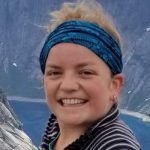 mikala jordan, Department of city & metropolitan planningPlanner, Wasatch Front Regional Council
mikala jordan, Department of city & metropolitan planningPlanner, Wasatch Front Regional Council
Growing up in Maine, I developed a love for the outdoors and an interest in the environment. I pursued these interests academically, and in 2018 I completed my B.S. in Environmental Science and Geography from Villanova University in Pennsylvania. At the University of Utah, I will pursue a Master's in City and Metropolitan Planning. With Dr. Danya Rumore¹s guidance, I will investigate the relationship between land use management decisions and the livability, sustainability, and resiliency of gateway and natural amenity communities.
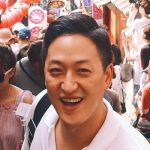 junsik Kim, Department of city & metropolitan planning
junsik Kim, Department of city & metropolitan planning
II was born in Seoul, South Korea. I obtained my bachelor¹s in Landscape Architecture from Kyungpook National University and my master¹s from Seoul National University, South Korea. Following graduation, I worked at SNU¹s Research Institute of Agriculture and Life Sciences for a year and a half to create sustainable urban environments and reduce the impact of climate change on health outcomes. After then, I worked as a researcher at the National Institute of Biological Resources under South Korea¹s Ministry of Environment, where I used GIS to conduct environmental analysis.
At the University of Utah, I will be working under the direction of Dr. Reid Ewing in the Department of City & Metropolitan Planning. I am interested in analyzing pedestrian environments and developing an analysis of cities to maximize the effects of transit-oriented development (TOD). As a Ph.D. researcher, I will seek strategies to solve various microclimate issues in urban areas, find the optimal form of the urban morphology and green infrastructure, and minimize any negative impacts of using TOD in sustainable urban development
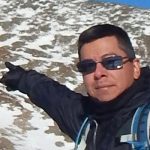 raul ochoa, Department of GEOLOGY & GEOPHYSICS
raul ochoa, Department of GEOLOGY & GEOPHYSICS
Originally from west Texas, I received my Bachelors of Science from the University of Texas in El Paso and my Masters from Purdue University with a focus in geology and expertise sedimentology. After my Masters I worked in the oil and gas industry for five years as an unconventional petroleum geologist in appraisal and development.
At the University of Utah I will be working with Dr. Lauren Birgenheier. I will be pursuing my PhD in Geology with my research focusing on sequence stratigraphy and understanding the mechanics of unconventional reservoirs and how they pertain to addressing energy issues in relation to oil exploration. As we see the effects of global change and the continued necessity for natural resources, understanding the effects of such a key component of our lives and knowing how to mitigate requires a host of members from the scientific community to minimize the risks and operate safely.
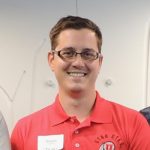 Daniel Quintanilla, Department of Geography
Daniel Quintanilla, Department of Geography
I was born to a military family and moved around a lot before I settled on doing my undergraduate degree at the University of Texas at Austin with a BA in history. After completing my degree, I was a GIS intern at El Camino Real de los Tejas National Historic Trail Association. From that internship I gained practical skill using GIS for analysis. I pursued my MA at the University of Missouri at Columbia (MIZ-ZOU) in geography along with a Geospatial Intelligence Certificat from the USGIF. During the summer of 2017, I was an imagery analyst intern for a government agency in Washington D.C.
I am currently pursuing a PhD in geography at the University of Utah. Under Dr. Rich Medina's guidance I will look at the relationship between sustainability and extremism reduction. Currently I am working on a project looking at suicide rates within the Salt Lake City area and criminal activity within the Los Angels are. My other research interests include human, drug, and weapons trafficking, terrorism activities, remote sensing, geospatial intelligence, and GIS systems.
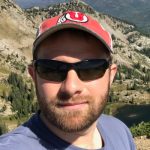 Dustin Roten, department of atmospheric science
Dustin Roten, department of atmospheric science
Postdoctoral Research Fellow, NASA Jet Propulsion Laboratory
I am a first generation college student who grew up in western North Carolina, the heart of the Appalachian Mountains. I graduated with a B.S. in Physics and Mathematics from Appalachian State University (Go 'Neers!) where I worked as a research assistant in an Atomic, Molecular, and Optical (AMO) Physics laboratory. In this lab, much of my work was in plasma diagnostics. After the completion of my undergraduate degree, I spent a year as a math teacher at Ashe County High School and adjunct physics instructor at Wilkes Community College. I then returned to App State to complete my M.S. in Engineering Physics and M.A. in Mathematics. During this time, I worked in a research group that sought to understand the characteristics of large point sources (power plants) and their roles in CO2 emission inventories as well as emission allocation methodologies.
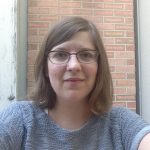 Elizabeth Giorgi, Department of Communication
Elizabeth Giorgi, Department of Communication
Visiting Assistant Professor of English and Journalism, Beloit College
I completed a Bachelor of Science in Journalism at Boston University, and spent the next several years working as a newspaper reporter in my Pennsylvania hometown, where I covered everything from health, fitness and the arts to music, goose banding and roller coasters. In 2013 I moved to Iowa to pursue a Master’s of Fine Arts in Creative Writing & Environment. My creative work explores the ways that humans interact with and experience their environments, both natural and built, and the interplay between ecology and human experience.
I will be working with Dr. Julia Corbett in the Department of Communication. My research interests include the ways in which scientific concepts are communicated in mass media; how scientific literacy impacts public understanding of issues like climate change, GMOs, and medical data; and how scientists and researchers can better utilize communication modes to control and shape the narrative about their own work.
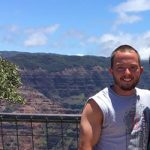 Austin Green, Department of Biology
Austin Green, Department of Biology
Postdoctoral research fellow under the Science Research Initiative, University of Utah
Growing up, nature and sports were two of my great passions. I try to spend as much time as I can hiking, camping, or playing ball. I am a Utah native, and I received my bachelor¹s in Biology at the U.
I will be working with Dr. Cagan Sekercioglu in graduate school, where I hope to study the mammal community in the Central Wasatch Mountain Range. I intend to use camera traps to elucidate the effects of human development on multiple aspects of mammal community ecology. Much of my fieldwork will require help from citizen scientists, and I hope that together we can construct a sustainable management strategy for the Central Wasatch Mountain Range, one that protects our community¹s passion for both recreation and wildlife.
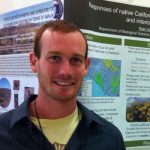 Ryan Johnson, Department of Civil and Environmental Engineering
Ryan Johnson, Department of Civil and Environmental Engineering
Postdoctoral Researcher, The University of Alabama
I completed my Bachelor's in Science at University of California, Irvine in Earth System Sciences and then my Master's at California State University, Fullerton in Environmental Sciences. During and between academics, I have worked in the Sierra Nevada mountains as a researcher as well as traveling throughout the western United States racing mountain bikes and chasing my passion for outdoor recreation.
Now focused on working towards my doctorate in Civil and Environmental Engineering under the guidance of Dr. Steven Burian, I will be researching issues surrounding the Water, Energy, and Food nexus. A main focus will be connecting remote sensing access to climate, labor, and water to urban agriculture to develop synergistic relationships between waste disposal, energy production, and food security. I am excited to be a part of the university's Global Change and Sustainability Center which promotes collaboration with other students and faculty who share similar visions of a more sustainable future.
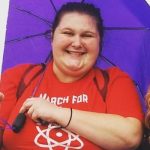 Taylor Johnson, Department of Communication
Taylor Johnson, Department of Communication
Assistant Professor, University of Wisconson, La Crosse
I received a B.A. in History from the University of Central Florida and an M.A. in Communication from James Madison University. My research interests include environmental justice, indigenous decolonial rhetoric, and resistance to U.S. militarization. I will be working with Dr. Danielle Endres in the Department of Communication.
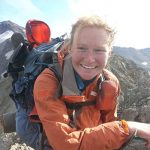 Kelly Kerr, Department of Biology
Kelly Kerr, Department of Biology
Throughout my academic and professional career, I have developed a strong interest in plant science and a fascination with forest ecosystems. I have a B.S. in Plant Biology from UC Davis, a M.S. in Forest Ecosystems & Society from Oregon State University, and have participated in plant research projects throughout California, the Pacific Northwest and Georgia. I am an avid outdoor enthusiast and look forward to exploring the recreational and natural areas in and around Utah.
At the University of Utah, I will be working under the direction of Dr. Bill Anderegg. My research will focus on understanding how forest tree species will respond to a changing climate using multiple scientific disciplines, such as physiology, ecology and climate modelling. My goal is for these research efforts to contribute toward ensuring the future longevity and sustainability of forest ecosystems. I am excited about the opportunity for interdisciplinary collaboration as I work toward my research goals.
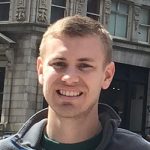 Joey Krueger, Department of Geography
Joey Krueger, Department of Geography
Assistant Project Manager, Ensign Engineering
A native of the flat lands, I was born in Fort Worth, Texas and grew up in the Wichita, Kansas area. In 2014 I graduated from Oklahoma State University with a Bachelor of Science in Civil Engineering and a minor in Geography. I am new to Utah, having just moved from Kansas City where I worked as a structural engineer-in-training in the oil and gas industry for the past two and a half years.
At the University of Utah I am pursuing a Master of Science in Geography, studying under Dr. Summer Rupper and focusing on climatology, climate change, snow and ice, and water resources. I look forward to applying my background in the energy industry to address pressing sustainability issues and to working with a diverse group of students and faculty at the GCSC.
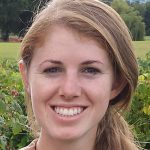 Brooke Stanislawski, Department of Mechanical Engineering
Brooke Stanislawski, Department of Mechanical Engineering
Postdoctoral fellow, National Renewable Energy Laboratory.
Born in Southern California, I moved to Evanston, IL to attend Northwestern University for a B.S. in Mechanical Engineering. As an undergraduate, I worked with Engineers for a Sustainable World in small-scale wind energy projects that combined my interests in sustainable development and technical design. After graduation, I entered into an Engineering Development Program with Siemens Energy where I completed a rotation in large-scale wind and worked in gas turbine casings design for the following 3.5 years.
I am excited to return to the world of renewable energy through research in novel applications of fluid mechanics to renewable energy technology with Dr. Marc Calaf. I will be pursuing a Master's Degree in Mechanical Engineering and hope to contribute to the technical advancement of renewable energy technology while playing an active role in our cultural shift towards a sustainable-minded future.
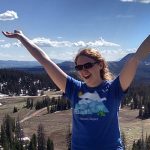 Emily Willis-Sylvester, Department of Political Science
Emily Willis-Sylvester, Department of Political Science
I was raised in the mountains of Utah where I spent much of my childhood camping, hiking, and skiing. Since my sophomore year of college, my research interests have focused on the human-side of natural disasters. Because of my interest in natural hazards, I have a background in environmental history, environmental science, geographic information systems, and urban planning.
I developed an interest in the interactions between climate change, hazards, and land use decisions while completing my masters in urban planning at the University of Kansas. Through my thesis research, I found that most counties in the interior US have not made efforts to mitigate heat waves—one of the hazards most closely associated with climate change. My research helped me realize that adaptation to climate change is being slowed due to a lack of policies. While pursuing my PhD in Political Science and working with Dr. Tabitha Benney, I plan to continue researching climate adaptation policies and efforts, particularly at the local and state levels of government.
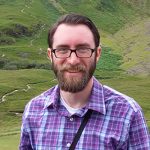 Kurt Wilson, Department of Anthropology
Kurt Wilson, Department of Anthropology
Postdoctoral fellow, University of Utah department of geography
After growing up in Wisconsin and staying in-state to take a bachelor’s degree in History I moved to Iowa where I earned a master’s degree in Education. I worked in higher education in numerous capacities until I decided to shift my focus back to the past and earned a master’s degree in Anthropology: Archaeology.
Working in higher education elicited a keen interest in social inequality and at the University of Utah I will be working in the Department of Anthropology with Drs. Brian Codding, Joan Coltrain, and Jack Broughton to investigate emergent social inequality in mid-level societies. Utilizing stable isotope analyses, behavioral ecology, and zooarchaeology I want to explore early causes and impacts of social hierarchy.
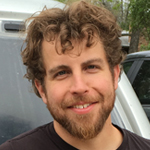 Emerson Arehart, Department of Mathematics
Emerson Arehart, Department of Mathematics
I grew up moving every couple of years, but stayed in Reno, NV, for long enough to finish high school and a bachelor’s degree in Mathematics. Since finishing college, I’ve been lucky enough to work in a range of jobs, from slot machine designer to honeybee breeder.
At the U, I plan to work with Fred Adler to develop mathematical tools which better describe complex interactions in nature, especially along the human/industrial interface with the natural world. By finding new ways to frame complicated problems, and adapting mathematical tools to better fit the functionality of the natural world, perhaps we can find ways to help overcome some of the most important challenges of our times.
Debolina Banerjee, City and Metropolitan Planning
I was born in Kolkata, India. My studies, a Masters in Geography and a Masters in Environmental City Planning, introduced me to environmental geography and sustainability studies specifically veered towards creating environmentally robust urban centers, methods to apply geographic knowledge into pragmatic solutions for urban quandaries, and methods of controlling urban air pollution. These culminated in a desire to further my research acumen in designing an adaptive city, resilient towards any natural or anthropocentric hazard.
In the University of Utah I shall be working with Sarah Hinners. My research will concentrate on sustainable development in developing countries. My research will assay a planning area from an ecological perspective and correlate the role of efficient natural resource management with overall prosperity of all sections of the society. This study will reiterate the importance of urban design through correlation analysis of incompatible land uses, economic burden on health, and give a positive direction towards reorientation of existing policies safeguarding both human health and natural environment.
Kevin Craft, Atmospheric Science
I was born and raised in Albuquerque New Mexico and graduated from the University of New Mexico with a B.S. in Mechanical Engineering and Applied Math. I enjoy spending time in the mountains running, cycling, hiking and skiing.
I will be studying under Dr. John Horel in the department of Atmospheric Sciences mountain meteorology group. I hope to contribute to the group and their effort to solve air quality issues over areas of complex terrain, among other various problems. I look forward to working on entirely new problems and learning about the atmosphere and the many weather phenomena.
Dale Forrister, Biology
Born and raised on a dirt road surrounded by forest in rural Vermont, I’ve always grown up with an appreciation for nature. In college, I decided to head west to studied Biology, Chemistry, and Spanish at Lewis & Clark College, in Portland, OR. Living in the Pacific North West opened my eyes to how beautiful and awe-inspiring pristine, old growth, forests can be. I've greatly enjoyed living in Utah for the past two years and exploring its natural wonders through backpacking, biking, hiking and skiing.
I was able to connect my deep seated passion for Latin America and interest in forest ecology when I took a job as a field technician for Drs. Phyllis Coley and Thomas Kursar where we worked in Tiputini, Ecuador studying tropical trees and their insect herbivores. I have spent the past two years working in the Coley/Kursar lab here at the University of Utah and I look forward to beginning a Ph.D in the same lab. I plan to continue studying plant herbivore interactions in the tropics, focusing on plant defense chemistry and how plant defense traits influences the diversity of insects found in tropical forests.
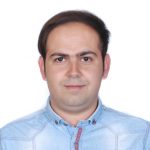
Majid Heidarifar, Electrical and Computer Engineering
I was born in Iran, and received a B.S. degree from Isfahan University of Technology and a Master's degree from University of Tehran both in electrical engineering with the focus on power systems.
The widespread adoption of renewable energy resources and electric vehicles (EVs) in the future power systems to mitigate the destructive effects of global warming is unavoidable. However, the existing power systems may not tolerate high penetration of these resources, because of increasing the likelihood of occurring overload and overvoltage events in power systems components. The existing power system infrastructures must indeed be strengthened, requiring a huge amount of financial budget; indeed, the economic constraints in each engineering decision are limiting factors. The main focus of my research during my Masters studies was to propose methodologies for existing power systems to accommodate substantial penetration of renewables and EVs.I am pursuing a Ph.D. in Electrical and Computer Engineering with Masood Parvania.
Kimberly Kernan, Environmental Dispute Resolution Program
I grew up in the Seattle area and obtained my law degree from the University of Washington. After spending eight years as a trial attorney, I took a break and spent a summer volunteering for the Rocky Mountain Institute. Subsequently, I moved to Bay Area and became a municipal attorney working on various land use, real estate development, and environmental issues. Many of these City and County projects involved the public, private, and non-profits sectors making for fascinating, but complex negotiations.
I will be working towards my L.L.M. in Environmental Law at the S.J. Quinney College of Law. My goal is to combine my multi-faceted negotiations background with current legal issues and identify potential public-private projects that could benefit from collaborative negotiation in search of sustainable outcomes. Specifically, I intend to focus my research on the rapidly developing areas of community solar and micro-grids and the legal and administrative challenges that impede the advancement of these types of energy systems.
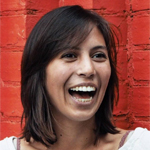 Jory Lerback, Geology and Geophysics
Jory Lerback, Geology and Geophysics
Leaving my southern California roots, I moved to Pennsylvania to attend Franklin & Marshall College where I received a B.A. in the geosciences. Since then, I have worked in both the private sector of groundwater exploration and at the American Geophysical Union (AGU). At AGU, I was able to combine my interest in social psychology, environmental activism, and the geosciences by interpreting datasets to increase inclusivity in the industry and broaden the audience of geoscience advancements.
I am attending the University of Utah to work towards developing a more sustainable pattern of natural resource consumption by highlighting the interconnectedness of earth-systems. I will work towards this objective through the Global Change & Sustainability Center as well as the interdisciplinary research on the Bonneville Salt Flats (BSF) with Dr. Brenda Bowen. My concentration will be on the groundwater flow and structural conditions beneath the BSF.
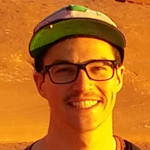 Cody Lutz, City and Metropolitan Planning
Cody Lutz, City and Metropolitan Planning
I was born in the Denver area and was raised in Southeast Idaho. My interest in the relationship between societies and their environments led me to study Environmental and Natural Resource Economics at Utah State University. I enjoy living in the West because of the abundant outdoor recreation opportunities, and skiing in particular. (Protect our winters!)
While working towards a Master’s in City and Metropolitan Planning at The U, I hope to learn how societies can use their resources more efficiently and reduce waste, and to adapt to changing conditions. I am also interested in the integration of human and natural systems. I will be working with Dr. Danya Rumore on collaborative resilience planning efforts in Zion National Park and gateway communities, in the face of increased visitation, limited water resources, and perceived threats to local quality of life. I am excited for the opportunity to interact with a diverse group of faculty and students with a shared enthusiasm for sustainability.
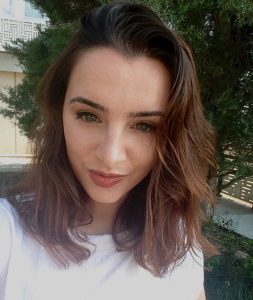 Emily Post, Anthropology
Emily Post, Anthropology
I’m East Coast born and bred, originally from Connecticut. I'm also a recent graduate of UConn, where I achieved my Bachelors in Anthropology with a minor in Evolutionary Biology and Ecology. I made the big move out West this summer to achieve my Master’s in Anthropology, under the Evolutionary Ecology concentration.
My primary research interests concern the evolutionary ecology of human social networks- how social networks are formed in certain environments, what possible functions they provide, and what strategies are used to maintain them. I plan to work in collaboration with Dr. Shane Macfarlan of the Department of Anthropology, who studies small-scale societies in Mexico, the Commonwealth of Dominica, and Ecuador. By combining our interests, I plan to assess how people employ social networks to buffer socio-ecological risk associated with climate change. In today’s world, small scale societies often have the unfortunate burden of being the first to feel the impacts of change in the Earth’s ecosystems. By studying the support networks of small-scale populations, I hope to improve the well-being of those who are impacted by climate change through empirically-based, culturally-sensitive policy, and possibly be able to ‘scale up’ results to improve first-world nations’ ability to contend with these changes.
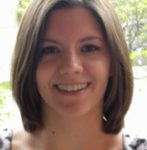 Vanessa Bailey
Vanessa Bailey
Department of Geography
I grew up in rural Wisconsin and attended the University of Wisconsin Oshkosh where I studied Geography and German. In my free time, I enjoy cooking, drawing, and reading.
At the University of Utah, I am working toward my Master's in Geography, studying climatology and other areas of physical geography. Working with Dr. Simon Brewer, I plan to focus on climate modeling. I am interested in relatively short-term changes primarily on the North American continent during the past few thousand years. While I was earning my B.S., I had the opportunity to participate on a study abroad trip at a sustainable energy company in Germany. It was there that my eyes were opened to the significance of sustainability. With my research, I hope I can help distinguish between the effects of natural phenomena and the impacts of human activity on climate in order to help direct policy to limit both climatic changes and their societal impacts.
Cassandra Gallegos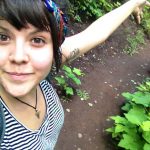
College of Law
Originally from Tucson Arizona, I moved to Salt Lake City at an early age and have pretty much grown up in Utah. I held interdisciplinary interests throughout undergrad by receiving a B.A. in Environmental Studies and Philosophy from Pacific University in Forest Grove, Oregon. While in Oregon I also received my Permaculture certificate and I remain an avid gardener and love the outdoors.
As a student of S.J. Quinney College of Law my research interests involve raising awareness of legal issues pertaining to animal law and environmental law. I have always been interested in how states can work to strengthen regulations governing factory farms that promote both sustainable and ethical changes. I will be working with various faculty of the College of Law on my research project during my time as a GCSC Fellow. I am so grateful for the support of the GCSC to enable my pursuit of interdisciplinary studies at the University of Utah and I look forward to working with the other Fellows.
Nipun Gunawardena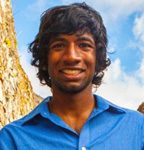
Department of Mechanical Engineering
Born and raised in Salt Lake City, Utah, I spent my youth engaging in various outdoor activities and reading. I received a B.S. in mechanical engineering from the University of Utah, where I decided to stay to do my Ph.D.
I am working towards my Ph.D. under Dr. Eric Pardyjak from the Department of Mechanical Engineering, and we work on topics related to environmental fluid dynamics. Currently, I am working on developing low-cost, distributed embedded systems that can be used to take atmospheric and environmental measurements over varied terrain. I then apply machine learning algorithms to this data to produce meaningful conclusions from the data without resorting to physics-based models. Ultimately, I would like to increase the performance of both the measurement and analysis systems in environmental applications.
Julia Howe
Department of Geology and Geophysics
A native of Charleston, South Carolina, I headed further south for college and received a B.S. in Geology and a B.A. in Spanish from Florida State University. During my undergraduate career, I had an internship with a local geotechnical engineering firm that inspired my interest in the overlap between geology and engineering.
I am specifically interested in geologic hazards; the mechanisms that cause them, and also the way communities make efforts to prevent and remediate them. As a reflection of this interest, I will be working towards an M.S. in Geological Engineering with Dr. Paul Jewell studying earthquake hazards along the Wasatch Fault in Salt Lake City.
Meaghan McKasy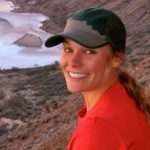
Department of Communications
A native to the Pacific Northwest, I moved out east to attend Boston College and earned a BA in Communication, with a minor in Environmental Studies. After four years in Boston, I realized that I missed the west, and so I moved to Salt Lake City to attend the Environmental Humanities Graduate Program at the University of Utah. Following the completion of my Masters degree, I spent four years working in alternative energy in both the non-profit and for-profit sectors.
Through my work in renewable energy I started to notice the array in social perceptions of alternative energy. I am interested in how people respond to certain language, messaging and framing of ideas with regards to energy production and usage. More so, what is it that influences society's perceptions and values, and from that how do we create cultural change with regards to our energy selection? I will be exploring these questions while working towards my PhD with my adviser Professor Sara Yeo in the Communication department.
Crystal Painter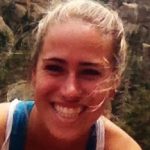
Department of Atmospheric Sciences
I grew up at a summer camp on Lake George in the Adirondack Mountains of Upstate New York. I then moved to Southern California to attend the University of Redlands, where I studied environmental science and physics, played lacrosse, and was an outdoor trip leader. I studied abroad in Kenya and Tanzania, where I had the opportunity to do field research for wildlife management. After graduating, I moved to The Republic of Palau in Micronesia, where I worked as a natural history kayak guide and spent my free time scuba diving and exploring the ocean. My work with ecological sustainability is interconnected to my interest in earth sciences. After living through Typhoon Haiyan, which tore straight through Palau, my interest in atmospheric science was ignited.
In the University of Utah¹s department of atmospheric science, I will be working with Dr. Ed Zipserto research the global distribution of precipitation, using satellite estimates and more detailed data from surface-based field campaigns. Some of the outstanding unanswered questions relate as much to understanding current global and regional climate as they do to future climate. One such question is whether flood-producing rainstorms are more closely related to the intensity of individual storms, or to the larger-scale circulation systems that determine the environment of storms.
Lauren Zuromski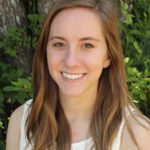
Department of Atmospheric Sciences
I was born and raised in Florida and received my B.S. in Meteorology from Florida State University. During my time as an undergraduate at FSU, I studied heavy rainfall events in the Southeastern U.S. as my Honors Thesis. I also held two internships in Pullman, WA, and Fairbanks, AK, researching Washington's air quality and impactful Alaskan weather events, respectively. Now as an Atmospheric Sciences M.S. candidate working with Dr. John Lin, I will be conducting air quality research by looking at CO2 emissions.
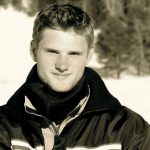 Joshua Barnett
Joshua Barnett
Department of Communication
Assistant Professor of Communication Arts and Sciences, The Pennsylvania State University
I grew up wandering the woods of northeast Georgia, frequently fishing for Southern Appalachian brook trout in tiny mountain streams, and gradually developed an interest and love for nature. My training in communication studies at the University of Georgia and in communication and cultural studies at Indiana University, where much of my research focused on environmental justice rhetoric, enabled me to complicate and enrich my understanding of the interconnectedness of nature and culture.
In the University of Utah's department of communication, I will be working with Dr. Danielle Endres, developing an interdisciplinary research program that addresses the connections between what I call 'the chemical and the cultural', a project that confronts questions about what it means to be a political subject in a world where chemicals are ubiquitous. What does it mean to 'involuntarily ingest' chemicals? Or 'willfully expose' oneself to chemicals? How do the chemical and the cultural converge? And what does it mean to enact a politics against or in favor of particular chemicals? Such questions anchor the Chemical Cultures project and provide fodder not only for conversations but also for thoughtful contemplation during my routine hikes and fishing trips in the Salt Lake Valley.
Xiaorui Huang
Department of Sociology
Assistant Professor of Sociology, Drexel University
Originally from China, I received my B.S. from the University of Oregon, where I majored in Sociology and International Studies, and minored in Environmental Studies and Political Science. I love cue sports and was an active player in the local pool league in Oregon.
The environment has been and will be the theme of my interdisciplinary academic training. I am particularly interested in the political economy of global climate change: how does climate change relate to the current economic system? What are the structural barriers created by the system that prevent human society from addressing climate change? And how can we overcome these barriers? My graduate advisor is Dr. Brett Clark.
Annie Putman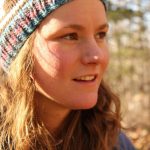
Department of Geology and Geophysics
Hydrologist, U.S. Geological Survey
I received my B.S. from Michigan Technological University in Environmental Chemistry, and went on to spend a year at Los Alamos National Lab in a post-baccalaureate program. Most recently I received my M.S. from Dartmouth College in Earth Sciences. Along the way I've made time for outdoor play, enjoying activities like running, climbing, Nordic skiing, and camping as outlets for inspiration and recharge.
Using stable isotopes of hydrogen and oxygen in water and air mass back trajectories as tools, I investigate current and future climate via incipient changes to the hydrologic cycle. My Master's research investigated this topic in Barrow, Alaska. During my PhD with advisor Gabe Bowen, I hope to include greater expanses of the Arctic as well as shift focus to regions prone to drought.
Loren Santana
Department of Mathematics
I grew up in New York City. I attended Skidmore College where I studied mathematics and environmental studies. After graduating, I participated in The Post - Baccalaureate Program for Women in Mathematics at Smith College.
My current research interests lie in mathematical biology. In particular, I'm interested in studying infectious diseases and how mathematical concepts can be used by incorporating environmental and biological components to study disease dynamics. My graduate advisor is Dr. Fred Adler.
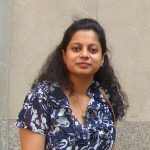
Pratiti Tagore
Department of City & Metropolitan Planning
Visiting Assistant Professor, Trinity College
I was born and educated in the bustling city of Kolkata, India. I completed my undergraduate degree in Architecture from Bengal Engineering & Science University, India, after which I moved to Delhi, where I earned a post graduate degree in Urban Planning from School of Planning and Architecture, New Delhi. As a final year project, I analyzed the environmental impacts of human activities such as poor sanitation habits, discharge of effluent into water channels, and construction of rapid transit systems on the river beds. I first worked as an Urban Researcher in Chennai, India, and later worked as an Architect and Urban Planner in Kolkata, India.
In the course of my post graduation, and later while working on field, my interests gradually shifted from core architecture to physical infrastructure planning. I believe good infrastructure is accessible to all regardless of financial ability, which was the primary driving force of the shift. My research interests include development of water & sanitation management systems, along with design and planning of the same in congruence with transit development. My graduate advisor is Dr. Reid Ewing.
Tho "Thomas" Tran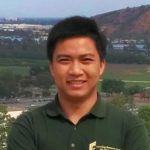
Department of Mechanical Engineering
Assistant Professor of Mechanical Engineering, Indiana Institute of Technology
I grew up in a small town called Hoi An in Vietnam. For many reasons, I call myself a country boy. I have lived my whole life by the beach, where I play soccer and swim almost every day. I attended high school in Vietnam, and received my B.S. in Mechanical Engineering from Cal Poly Pomona in Southern California. I have been in the States as an international student for 6 years and I am very excited to attend the University of Utah for my doctorate degree.
I am working towards my PhD with Dr. Amanda Smith in the Mechanical Engineering Department. My research involves in experimentally demonstrating of pressure retarded osmosis (PRO) membrane technology for hydroelectric power generation. This project will advance the implementation of PRO over technical and economic barriers.
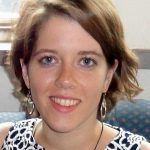
Danielle Ward
Department of Geography
Environmental Associate, The Clark Group LLC
Originally from upstate New York, I held interdisciplinary interests throughout undergrad by receiving a B.A. in English Literature and Geological Science from the State University of New York at Geneseo. Now that I am a member of the University of Utah’s geography department, I am very excited to continue interdisciplinary work through collaborating with the other GCSC fellows. At the University of Utah I will be pursing an M.S. working with Dr. Andrea Brunelle focusing on the reconstruction of past climates using pollen. After moving across the country, I'm excited to immerse myself in the natural beauty of the Western United States by exploring Utah's many national parks. When I’m not doing research I enjoy hiking, skiing and reading science fiction novels.
Chris Zajchowski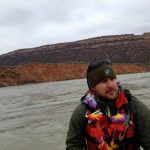
Department of Parks, Recreation and Tourism
Assistant Professor of Park, Recreation, and Tourism Studies at Old Dominion University
As a transplant to the Beehive State, I’m excited to return to mountains, rivers and the desert. Over the past ten years I have filled my days working as a field science instructor, river guide, challenge course facilitator, and most recently program coordinator for outdoor experiential education at Loyola University Chicago. I received a B.A. in International Literature and Environmental Studies from Colby College, and completed a M.S. in Experiential Education at Minnesota State University, Mankato.
I have always been fascinated, albeit broadly, by the way we humans think about and relate with nature. My proposed doctoral work with Dr. Matthew Brownlee uses the biophilia lens to examine the relationship between immersive outdoor experiences within winter environments and phenomenological constructions of winter. I am grateful for the support of the GCSC to enable my pursuit of interdisciplinary inquiry at the University of Utah.
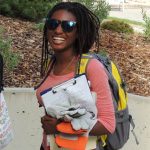 La'Shaye Ervin Cobley
La'Shaye Ervin Cobley
Department of Biology
Science Fellow at California Council on Science and Technology (CCST)
In many ways, I am a city girl. I grew up in Brooklyn, NY. However, I have developed a very strong passion for the great outdoors. Growing up, I was interested in how people in cities connected to nature. My interests lead me to gain my B.A. from Bowdoin College (Brunswick, ME), where I doubled in Biology and Africana Studies and minored in English.
I am starting my PhD with Dr. Diane Pataki. My research will explore the links between pollution and sociodemographics. I plan to use nitrogen stable isotopes as indicators of pollution in Salt Lake City.
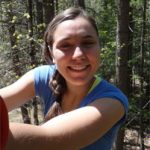 Logan Frederick
Logan Frederick
Department of Geology & Geophysics
I am from Arlington, VA. I attended Skidmore College in Upstate New York where I played varsity basketball. I have been a volunteer firefighter for the last 7 years. I will be studying under Bill Johnson with a focus in hydrology.
I am interested in surface groundwater interactions. Eventually, I would like to research the implication of forest fires on surface and groundwater systems.
Department of Mechanical Engineering
Postdoctoral fellow, Lawrence Livermore National Laboratory
I grew up in Sandy, UT, where at a relatively young age I realized that I had a natural talent for math and I enjoyed discovering the way things worked. Mechanical engineering seemed like the obvious career choice. After serving a church mission in Rio De Janeiro, Brazil, I came home with a strong interest in sustainability and renewable sources of energy. I am also interested in thermodynamics, heat transfer and fluid mechanics, and have been working in the Environmental Fluid Dynamics Laboratory at the U.
My research involves the parameterization of turbulent transport of momentum, heat, and scalars over rough and mountainous terrain. I am using data that we acquired during the Mountain Terrain Atmospheric Modeling and Observations Program (MATERHORN) to evaluate current parameterizations and to explore alternatives. MATERHORN is a large, multi-institution, cross-discipline study centered on a field experiment that took place in Utah’s West Desert at Dugway Proving Ground in the fall of 2012 and the spring of 2013.
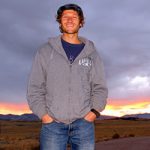 Zachariah Levine
Zachariah Levine
Department of City and Metropolitan Planning
Community and Economic Development Director at Grand County
I currently split my time between Moab and Salt Lake City. I chose to live in southeastern Utah because of the lifestyle amenities it offers -- outdoor recreation, wild landscapes, and an eclectic mix of people. Before moving here, I spent time in Malawi (sustainable community development) and India (interfaith peacebuilding). I received a B.S. in industrial engineering and operations research from the University of California, Berkeley.I am a transdisciplinary thinker that operates from a systems worldview. As a PhD student in City and Metropolitan Planning, I look at the interdependence of people, place, and design. Emphasizing the roles of water in the West, I am interested in applying our understanding of human-nature relationships to (re)create healthy communities. I am a founding member of the Ecological Planning Center and the Metropolitan Water Lab, and will work on the iUTAH- opens new window project in 2013-14.
Department of Geography
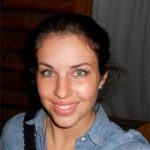
Emily Schulze
Department of Biology
Program Manager, Northrop Grumman
I am originally from Indiana, but mostly grew up in Los Alamos, New Mexico. I graduated with a B.S. in Biology from Colorado Mesa University in Grand Junction, CO and traveled back to New Mexico for a post-baccalaureate position at Los Alamos National Laboratory for a year. I was primarily involved with groundwater monitoring and environmental remediation; performing field work, collecting data, and lending technical support.
Currently I am working in a biogeochemistry group and will soon begin a project exploring ecohydrology of riparian trees and hydrogeology. I am particularly interested in the soil/plant and water interface, and the cycling of nutrients and energy between these systems. I look forward to working with ecological stable isotope experts in both biology and geophysics, as well as collaborating with peers throughout the U of U.
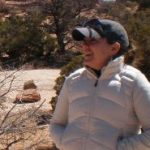
Megan Walsh
Department of Civil and Environmental Engineering
I grew up in Pittsburgh, PA where I developed a fascination with rivers and streams, since they are abundant in that region. I attended Penn State University where I received my bachelor’s degree in Civil Engineering and my master’s degree in Environmental Pollution Control. I have worked in both the public and private sectors in Maryland, Texas, and Utah. Throughout my career, I have been most interested in sediment transport, fluvial geomorphology, and stormwater runoff. Currently, I am working towards a PhD in Civil and Environmental Engineering where I plan to research the effects that the shale oil & gas industry has on sediment transport and geomorphology of receiving streams
Kenneth Dudley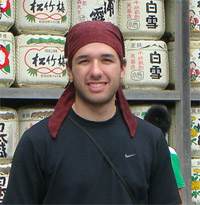
Department of Geography
Biodiversity and Biocomplexity Unit, Okinawa Institute of Science and Technology.
I graduated from the University of Utah in Environmental and Sustainability Studies B.S., Japanese B.A., and Geography B.S. in December 2011. I am currently a part of the Geography M.S. program. I was born and raised in Salt Lake City. I participated in a one year study abroad program in Japan where I discovered a profound interest in man-nature relationships and geographic differences between areas.I study the use of remote sensing to identify plant species and species level characteristics at large spatial scales. I am focused on the use of remote sensed imagery in tracking and assessing invasive species distribution and vegetation responses to climate change. Kenneth is now a GIS/RS Technician at Okinawa Institute of Science and Technology.
Derek Mallia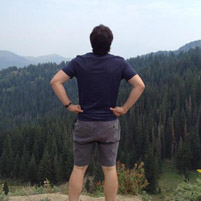
Department of Atmospheric Sciences
Research Assistant Professor, Department of Atmospheric Sciences at the University of Utah.
I grew up in Upstate New York just outside of Albany. I did my undergraduate studies at the University at Albany with a B.S. in Atmospheric Science. I received my M.S. degree in Meteorology at Plymouth State University where I did my thesis on the modeling ice accretion in cold and alpine environments.Currently, I am investigating the sources and sinks of air pollution in the Salt Lake using the Stochastic Time-Inverted Lagrangian Transport Model (STILT) coupled with Weather Research and Forecast model WRF-ARW which will output the meteorological fields needed to drive the STILT model. This model will allow us to quantitatively identify the upstream regions that are producing the most air pollution (both anthropogenic and natural sources). Derek is now a Postdoctoral Research Associate working with the Land-Atmosphere Interactions Research and Fire Modeling groups at the University of Utah.
I am from Albuquerque, New Mexico and graduated from Pomona College in 2009 with a BA in Biology. I have lived and traveled throughout South America. Here in Salt Lake I am enjoying learning and teaching at the U as well as exploring Utah’s fantastic wilderness.I am fascinated by the ways that organisms interact with each other- from the mutualisms between plants and seed dispersers to host-parasite relationships. As global change reshapes species’ ranges, novel contacts between organisms will continue to increase and understanding their impact on one another will be key for species’ management and conservation. I joined the Clayton-Bush Lab at the University of Utah in 2009 to study malaria parasites of invasive birds. I hope to better understand how parasites shape host behavior.
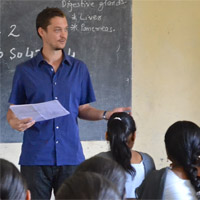 David Proffitt
David Proffitt
Department of City and Metropolitan Planning
Postdoctoral Research Scholar, Arizona State University
I am a Ph.D. student in the Urban Planning, Policy & Design program. Before coming to Salt Lake City, I spent 2011-2012 researching the urban heat island in Pune, India as a Fulbright scholar. I also worked at the U.S. Bureau of Land Management's Lower Sonoran Field Office in Phoenix. Planning is a second career; I started professional life as a journalist at The Arizona Republic newspaper, Dwell magazine, America West (Airlines) Magazine, and other publications. I hold a Master's in Urban & Environmental Planning and a bachelor's in English literature, both from Arizona State University.My broad research interest is urban environmental policy that linking urban systems to natural resource use, air pollution, and climate change. At the U, I am working on projects dealing with the urban heat island, international governance for sustainable development, and regional climate change mitigation policies.
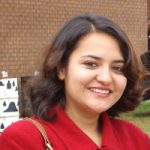
Pratibha Sapkota
Department of Civil and Environmental Engineering
Water resources engineer at Intera Geoscience Engineering Solutions in Tampa, FL.
I am currently a doctoral student in Civil Engineering department at University of Utah. I completed my Masters in Civil Engineering from University of Toledo, Ohio.
My master’s research was focused on modeling pollutant removal using constructed wetland. After completing my master’s, I returned to my home county Nepal and worked in International Water Management Institute (IWMI) as a consultant for over a year. My research in IWMI focused in surface water quality modeling area. I have experience modeling the influence of land use change and climate change impacts using WEAP (Water Evaluation and Planning) model. My specific research interests are in the areas of stormwater management, climate change impacts and sustainable water resources management.
Kimberly Smith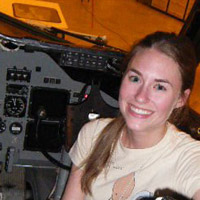
Department of Atmospheric Sciences
Air quality scientist, Idaho Department of Environmental Quality
I grew up in Boise, Idaho. In elementary school, I become deeply fascinated by weather. In junior high school, I fell in love even more with the Earth sciences, and I studied geosciences (specifically hydrology) and applied math at Boise State University.
I am currently studying the projected changes in the climate of the Wasatch Front and Range, specifically the changes in precipitation timing, type, and amount, and the effects these changes will have on water availability for those of us living along the Wasatch.
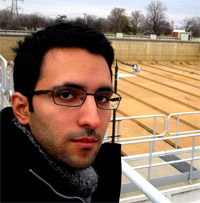
Hassan Tavakol-Davani
Department of Civil and Environmental Engineering
Senior Staff Engineer, Geosyntec Consultants
I was born in the capital city of Iran, Tehran. I pursued my elementary and higher education there, as well as my bachelor and master in Civil Engineering. Both my bachelor and master theses focused on water resources engineering, which guided me towards my professional career in Iran.
I am working on Urban Water Infrastructure Sustainability Evaluation (uWISE) project. The goal of the uWISE is to develop a stormwater model for the studied area, Toledo, Ohio, to evaluate the performance of Rain Water Harvesting (RWH) system in terms of sustainability, flood control and environmental impacts; then the optimum scheme of the area according to the usage and placement of RWH system will be proposed for current and future conditions. It studies the advantages of RWH system in controlling the impacts of climate change, land use change and urban expansion which are supposed to take place in future. Hassan is now Assistant Professor in Water Resources Engineering at San Diego State University.
Rebecca Terry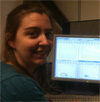
Department of Mathematics
Visiting instructor in the Department of Mathematics, Computer Science, and Statistics at St. Lawrence University
I am from Schenectady, a city in upstate NY. Growing up, I would spend Sunday afternoons on my paternal grandparents' farm and summers in the Adirondack Park with my maternal grandparents. As a result, I became interested in the impact humans have on the environment at an early age. As an undergraduate at Dartmouth College, I majored in Environmental Studies with a concentration in Economics. After working as a research assistant in the field of Environmental Economics, I realized I was most interested in the mathematical techniques used in the development of models that helped explain natural phenomena and anthropogenic effects. Before entering the Mathematics Ph.D. program at the University of Utah, I received a Post-baccalaureate Certificate in Mathematics from the Center for Women in Mathematics at Smith College. My research areas of interest include climate modeling, natural resource modeling, mathematical biology, and dynamical systems.
Crystal Tulley-Cordova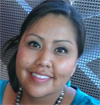
Department of Geology and Geophysics
Principal Hydrologist Navajo Nation Water Management Branch
I am an enrolled Navajo tribal member, and grew up on the Navajo Nation. I am a Ph.D. student in the Geology and Geophysics Department at the University of Utah. I received a M.W.R. in Water Resources and a B.S. in Earth and Planetary Sciences from the University of New Mexico.
My research interests span the fields of hydrology, chemistry and geology, which is reflected in the breadth of past and current research projects. Studying stream water isotopes in Red Butte Creek will provide hydrological data for the Red Butte Creek system. The collected data will be effective in understanding the human impacts on a natural system by conducting high frequency monitoring.
David Wheatley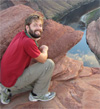
Department of Geology and Geophysics
University of Arkansas Geoscience Department
I am originally from Corona del Mar, CA. I did my undergrad at Wheaton College in Wheaton, IL and received a B.S. in geology. In addition to my geologic interests, I am interested in archaeology, especially of the ancient near East.
My research focuses on clastic liquefaction features and their associated soft sediment deformation in the Jurassic Carmel Formation in Southern Utah. These liquefaction features called clastic pipes or injectities can further our understanding of reservoir characterization and can be used as analogs for Martian geomorphic features. Additionally, these features have specific formation conditions, which allow for paleoenivornment and paleoclimate reconstruction.
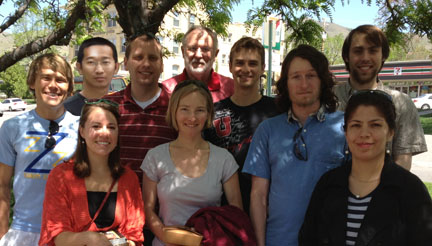
Vachel Carter
Department of Geography - Department of Botany, Faculty of Science, Charles University, Prague, Czech Republic
Allison Chan
Department of Biology - Los Alamos National Laboratory.
Youcan Feng
Department of Civil and Environmental Engineering - Postdoctoral Research Associate at Renaissance Computing Institute.
Shima Hamidi
Department of City and Metropolitan Planning - Assistant Professor, University of Texas at Arlington.
John Heiberger
Department of Civil and Environmental Engineering - Engineer and Project Manager at Kimley-Horn and Associates, Inc.
Olivia Miller
Department of Geology and Geophysics - Hydrologist, Utah Water Science Center, Salt Lake City.
Timothy Price
Department of Mechanical Engineering - Sr. R&D Engineer at Sandia National Laboratories.
Gerald Schneider
Department of Biology - Postdoctoral Researcher at Virginia Tech
Kyle Steffen
Department of Mathematics - Postdoctoral Researcher, Oden Institute for Computational Engineering and Sciences, U Texas, Austin
Thomas Walsh
Department of Civil and Environmental Engineering - civil engineer at Murray, Smith & Associates, Seattle

